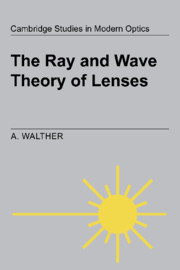Book contents
- Frontmatter
- Contents
- Preface
- Part one Preview
- Part two Geometrical optics
- Part three Paraxial optics
- Part four Waves in homogeneous media
- Part five Wave propagation through lenses
- Part six Aberrations
- 22 Perfect systems
- 23 The vicinity of an arbitrary ray
- 24 Third order aberrations
- 25 The small field approximation
- 26 Ray tracing
- 27 Aberrations and the wave theory
- Part seven Applications
- Appendix 1 Fourier transforms
- Appendix 2 Third order calculations
- Appendix 3 Ray tracing
- Appendix 4 Eikonals and the propagation kernels
- Appendix 5 Paraxial eikonals
- Appendix 6 Hints and problem solutions
- Bibliography
- Index
22 - Perfect systems
Published online by Cambridge University Press: 22 September 2009
- Frontmatter
- Contents
- Preface
- Part one Preview
- Part two Geometrical optics
- Part three Paraxial optics
- Part four Waves in homogeneous media
- Part five Wave propagation through lenses
- Part six Aberrations
- 22 Perfect systems
- 23 The vicinity of an arbitrary ray
- 24 Third order aberrations
- 25 The small field approximation
- 26 Ray tracing
- 27 Aberrations and the wave theory
- Part seven Applications
- Appendix 1 Fourier transforms
- Appendix 2 Third order calculations
- Appendix 3 Ray tracing
- Appendix 4 Eikonals and the propagation kernels
- Appendix 5 Paraxial eikonals
- Appendix 6 Hints and problem solutions
- Bibliography
- Index
Summary
Perfect imaging
Aberrations are deviations from perfect image formation. Ideally all the rays that come from any point in the object space should intersect at a single point in the image space. This is, however, not a realistic design goal, as was already intimated in chapter 1, and discussed in more detail in chapter 6. According to Maxwell's theorem, proved in section 6.5, it is incompatible with Fermat's principle for a lens with a finite power to form a perfectly sharp image of more than one object plane. We shall therefore call a lens ‘perfect’ if it forms a perfectly sharp image not of the entire object space, but of a single object surface, plane or curved. The image may be plane or curved as well.
The statement ‘it is incompatible with Fermat's principle that…’ leaves it unclear how the truth or falsity of the statement should be proved. It is preferable to use the assertion ‘no eikonal can be constructed so that …’. As an example we give a second proof of Maxwell's theorem. Take a lens with axial symmetry, and describe it by the angle eikonal W(L, M, L′, M′) from front focal plane to back focal plane. For a magnification β′ the object distance z, measured from the front focal plane, is n/β′A, in which A is the power of the lens. The image distance z′, measured from the back focal plane, is —n′β′/A.
- Type
- Chapter
- Information
- The Ray and Wave Theory of Lenses , pp. 227 - 237Publisher: Cambridge University PressPrint publication year: 1995



